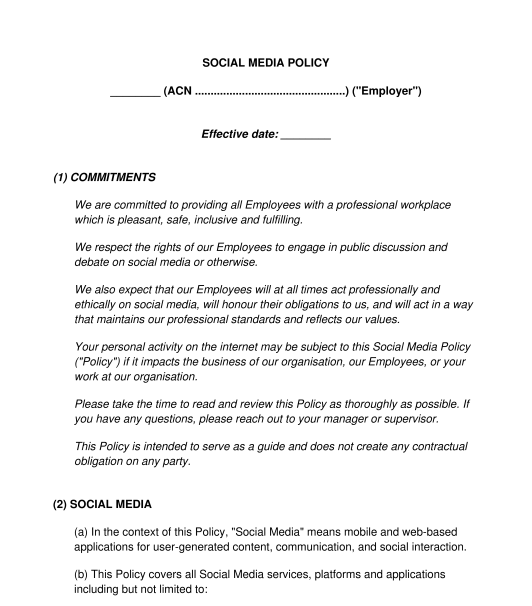 17/11/2025
17/11/2025

Answer a few questions and your document is created automatically.

Your document is ready! You will receive it in Word and PDF formats. You will be able to modify it.

 17/11/2025
17/11/2025
 Word and PDF
Word and PDF
 6 to 10 pages
6 to 10 pages
A Social Media Policy is a document established by the employer that outlines the rules, practices, and procedures for employees using social media, either on their own time or when representing the employer. In a Social Media Policy, the employer informs employees about the standards that are expected of them while using social media. It could cover things like use of personal social media at work or on work devices, discussing the employer on social media, or operating the employer's social media accounts.
An Employee Handbook is a comprehensive document which deals with a wide range of matters at the relevant workplace. It may touch on social media matters but will not usually go into as much detail as a Social Media Policy does.
A Social Media Policy is specifically focussed on social media matters so it usually goes into more detail than an Employee Handbook does. In addition, simply having a standalone Social Media Policy sends an important message to employees that the employer takes these matters very seriously.
While it is not mandatory for Australian organisations to have a written Social Media Policy, it is highly advisable to help manage the use of social media by employees. This can help the employer to manage its online reputation, and to comply with any relevant laws.
In addition to this Social Media Policy, there are various other employment policies that employers should consider, such as:
Usually senior members of staff will prepare the Social Media Policy. This could involve senior managers or directors, or a human resources officer.
There is no expiry date for a Social Media Policy so it can remain in place indefinitely. However, it should be reviewed regularly to ensure that it is up to date with current laws and with the organisation's current practices.
Yes, in some cases employees can be dismissed if they breach their employer's Social Media Policy.
Employers must ensure that their policies are clear, well-communicated to their employees and consistently enforced. Employers should also make sure that they follow their own Social Media Policy including any disciplinary processes that it spells out.
Once a Social Media Policy is ready, it should be printed and/or saved electronically and kept on file with the employer, and employees should be made aware of it. For example, any existing employees should be notified of it and given a copy of it. Many employers use a Letter to Employees about New or Updated Workplace Policies to do this. In addition, each time a new employee starts work with the employer, the new employee should be given a copy of the Policy.
In addition, it is a good idea to keep the Policy in a place where it is easy for employees to refer to it - for example, physical copies could be kept in communal areas such as staff rooms. It could also be made available online, for example on the employer's shared drive.
If the employer is getting employees to sign this Policy, the employer should get each employee to return a signed signature page, and should keep those signed pages on file.
From time to time, if the employer implements new rules or procedures, it may be necessary to update the Policy. When this occurs, the employer may notify employees of the updates, and release a new version of the Policy. The employer may ask employees to sign a new signature page at that time, to acknowledge the updated Policy.
In a Social Media Policy, the employer informs employees about the standards that are expected of them while using social media. The employer should ensure that the document accurately reflects their actual approach to these matters. This may cover such matters as:
Social Media Policies may be affected by various Australian laws.
For example, if bullying, harassment, victimisation or discrimination takes place via social media, then this may be affected by legislation such as:
If defamation occurs via social media, then this may be affected by legislation such as:
If an employee's use of social media leads to issues in relation to health and safety, then this may be affected by state or territory legislation in relation to work health and safety. Further information is available from Safe Work Australia.
In addition, the Fair Work Act 2009 (Commonwealth) deals with other employment matters such as unfair dismissal.
Ordinary principles of contract law, as provided by the common law, may also apply to the general terms of the employee's employment.
You fill out a form. The document is created before your eyes as you respond to the questions.
At the end, you receive it in Word and PDF formats. You can modify it and reuse it.
Guides to help you
Social Media Policy - sample template - Word and PDF
Country: Australia